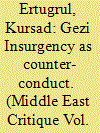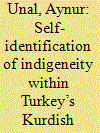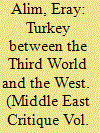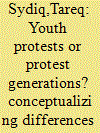| Srl | Item |
| 1 |
ID:
186932


|
|
|
|
|
| Summary/Abstract |
This article defines the Gezi insurgency as a case of ‘counter-conduct’ with a heterotopia in a Foucauldian sense and compares it with similar movements to underline its peculiarity. It argues that Gezi cannot be defined as an ‘anti-austerity’ or ‘anti-dictatorship’ movement. Rather, it was a struggle against the neoliberal-cum-neoconservative conduct under AKP rule and its leadership taking the form of a pseudo-presidential regime. Gezi not only was a search for a different conduct but also a possible self-conduct through self-invention in prefigurative experimentations with different ways of being and practicing direct democracy in the reclaimed public spaces that characterized the action process. What sustained this counter-action process was the spontaneous constitution or deployment of certain platforms like Blok and Çarşı which did not, in themselves, express or represent any given social or political organization nor a corresponding form of a generic identity. In the Gezi insurgency, actors tended to outflow their defining social categories and become a part of the series of performances in which a sense of self-transformation has been common.
|
|
|
|
|
|
|
|
|
|
|
|
|
|
|
|
| 2 |
ID:
186933


|
|
|
|
|
| Summary/Abstract |
In the 2016 Bir Zeit University elections Hamas’ women launched two videos in which un-veiled, western-dressed young girls urged viewers to vote for Hamas. The videos sparked a passionate debate: Religious forces accused the girls of being ‘westernized’ and abandoning the norm of Islamic modesty; while secular forces accused them of promoting a form of women’s empowerment linked to their success in accommodating religious values to secular ones. The debate mirrors scholarly works on Islamist women’s subjectivity that tend to adhere to the dominant liberal analytical frames and lack a clear problematization of the relationship between Islam, gender, and new forms of liberal and secular sensitivity, as Islamic practices, secularization, and neo-liberal projects are seen as opposed. Most of the literature that analyzes women within Islamist movements overlooks the historical and economic trajectories that have operated to shift the relation between gender, sexuality and religion. In 2017, I conducted extensive field research in the Occupied Palestinian Territories among Hamas women with the objective to unwrap the relationship between Islamism and the secular/neo-liberal and nationalist project instituted in the West Bank. By taking distance from the assumption that religion and secularism are opposing poles of a binary, this article provides an understanding of Hamas women’s shifting subjectivities in the encounter with new forms of secular modernity, an encounter that signifies a shifting understanding of the categories of secular and religious, and which I analyze through a new understanding of women’s bodies and sexuality.
|
|
|
|
|
|
|
|
|
|
|
|
|
|
|
|
| 3 |
ID:
186934


|
|
|
|
|
| Summary/Abstract |
Self-identification is a vital element in ethnic identity especially in the sense of indigenousness. This concept not only has been of concern for scholars, but also it is recognized as the most important definitive item in international law by such organizations as the UN, the World Bank and the ILO. This article focuses on self-identification of Kurdish ethnic identity by investigating how and to what extent indigeneity is expressed within the discourse on Kurdishness. Although the Kurds commonly are defined as an ethnic minority, the representatives of Turkey’s Kurdish political movement certainly refuse to be identified as such. The claim of pre-existence/indigenousness of the Kurds appears particularly in two levels that include the narrative of being an ‘autochthonous nation’ of Mesopotamia (‘kadim halk' in Turkish). Second, in reference to an agreement between Turks and Kurds during the First World War, Kurds are described as one of the ‘primary components [asli unsur in Turkish] of the Turkish Republic. To explore the concept of indigeneity based on self-identification within the discourse about Kurdishness, this article specifically examines how the Kurdish political movement in Turkey has a significant influence in regional politics and growing grassroots support.
|
|
|
|
|
|
|
|
|
|
|
|
|
|
|
|
| 4 |
ID:
186935


|
|
|
|
|
| Summary/Abstract |
This article analyzes the reasons behind the Third World-averse and overtly pro-Western character of Turkish foreign policy by focusing on the period 1961–65. I argue that Turkey’s lopsided foreign policy approach resulted from the failure to comprehend the advent of the Post-colonial phase of international relations and the leadership’s dismissal of non-alignment as a policy strategy in world politics. These factors resulted in Turkey’s overreliance on its alliance with the West through NATO. However, as the Cyprus Crisis of the early 1960s illustrates, the West was not always willing to support Turkey’s position.
|
|
|
|
|
|
|
|
|
|
|
|
|
|
|
|
| 5 |
ID:
186931


|
|
|
|
|
| Summary/Abstract |
In this article, I argue that contentious ruptures in Iran have produced socio-political generations with differing views on political processes and strategic approaches toward contestations. Using a constructivist approach to sociological generations, I argue that the experience of such events creates ruptures that shape the emergence of generations beyond demographic similarities. While the last event to produce major systemic change was the revolutionary generation, later generations had relative success in shaping relations with the state and defining new political strategies. The most recent protest cycle between December 2017 and November 2019 seems to have the capacity of shaping another generation: One that is defined by a greater disillusionment with the state and a strategy of contention defined by a more decentralized and more adversarial approach regarding state institutions. Barring major changes to accommodate this development, the regime may be facing the emergence of a new generational group whose attitudes and strategies could shape politics in Iran for decades to come.
|
|
|
|
|
|
|
|
|
|
|
|
|
|
|
|